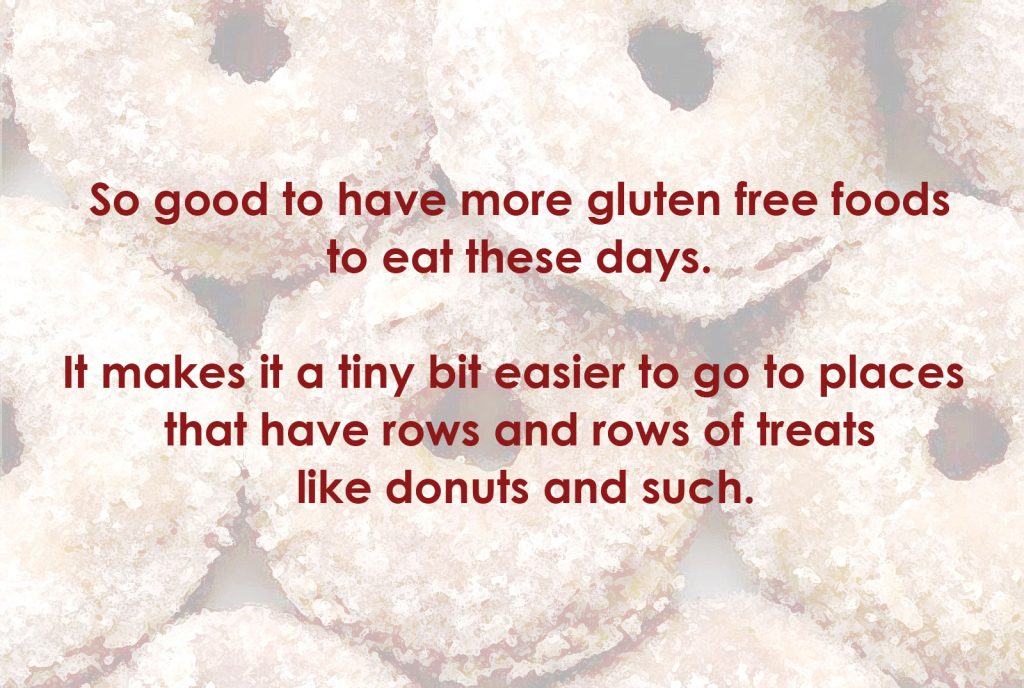
Celiac Disease vs. Gluten Sensitivity. Is Gluten Sensitivity a Fad or Fact? Are millions of people avoiding gluten ‘just because’ they have heard it could be healthier? What is the real scoop, and how can you weed through all the hype out there while still managing your own diet in the best way possible?
I have been on a gluten-free diet through a necessity for over 20 years. I know what happens when I accidentally eat something that is not gluten-free. This is not a choice I would like to have had to make… It is not easy, and it is pretty hard to take all the hype out there that presents those of us in this position as somehow just going along with a fad! I hope this article will clear up some things about gluten ingestion for you too.
Gluten-Free, You Can Do It -by Trina Astor-Stewart. Contains charts for Trina’s Flour and Bread Mixes. Three Series Of Mixes: Original, Corn, Nightshade, Tapioca and Rice Free Mixes. Over 300 Recipes. Ebook is available on Amazon.
What is the difference between Gluten Intolerance and Gluten Sensitivity?
Gluten Intolerance and Gluten Sensitivity are the same things. Some people think that gluten intolerance is a more serious condition than gluten sensitivity since the terms are both used almost interchangeably. Before the study by the University of Maryland people thought only Celiac Disease was a real condition caused by eating gluten-containing foods. Since the study, the condition is properly referred to as Gluten Sensitivity.
How many people are Gluten-Sensitive or Celiac?
- According to Dr. Fasano, of the University of Maryland, it is estimated that about 20 million people or 6% to 7% of the population of the USA may be Gluten Sensitive.
- According to Dr. Ford, author of The Gluten Syndrome, and a pediatrician in New Zealand, states that believes between 30% and 50% of the population could be Gluten Sensitive.
- Dr. Fine, of Enterolab and also a Gastroenterologist, also believes that Gluten Sensitivity probably affects half the population to some degree. Many Americans have either AGA-IgA or AGA-IgG antibodies to gluten. Dr. Fine also cautions that about 60% to 65% of people with autoimmune disorders, irritable bowel syndrome, chronic headaches and/or microscopic colitis conditions may have Gluten Sensitivity or be at risk of it.
- The percentage of those suffering from Celiac Disease is said to be about one in 133 people.
Regardless if you have Celiac Disease or Gluten Sensitivity; the cure is to eliminate gluten-containing grains. Gluten Containing Grains are: All Forms of Wheat (including Spelt, Kamut, Farro and Durum, Bulgar, Semolina, and ‘Couscous which is made from Durum flour); Other grains containing gluten are: Barley, Rye, Triticale and ‘Oats that have not been processed in a dedicated gluten-free facility’ and are therefore cross-contaminated. Those who have a Wheat Allergy will only have to eliminate wheat-containing grains and foods.
Is there a test for Gluten Sensitivity and Celiac Disease?
It was previously thought that the only way to test for Gluten Sensitivity was to remove gluten from the diet for one month or more and see if it cleared up any of your symptoms. This may still be a guide for many; however, at Enterolab, Dr. Fine says it does have AGA-IgA or AGA-IgG Antibody testing for Gluten Sensitivity.
There is a definitive test for Celiac Disease with the Biopsy Method.

I do make some at home now and then.
When I first found out that I was Gluten Intolerant, or as it is now called, Gluten Sensitivity, there was a great deal of controversy surrounding the issue. If you are not celiac, -there is a test for that… Then, the prevailing view at that time was that “it must be in your head.” Well, science has come a long way. Now, instead of suffering for years, as some people in the past have done, in some cases a decade or more, there is now help. Health professionals are much more aware of the problem and the variety of symptoms that can be associated with it. Some think that Gluten Sensitivity means you are not as sensitive as a Celiac, but for me, that is not the case.
A study in 2011 at the University of Maryland confirmed that ‘Gluten Sensitivity is a separate but real condition as opposed to ‘Celiac Disease.
Even so, being diagnosed with Gluten Sensitivity is still a bitter pill to swallow at first and I would not wish it on anyone. But the good news is, you will start to feel better almost right away! There are many more food choices than previously available.
Before the study by the University of Maryland, headed by Dr. Fasano, it was calculated the extent of those people requiring a gluten-free diet was only the celiac portion of the population at about 3%.
In a 2012 article, David Browne, Senior Analyst at Mintel, said in a Press Release, “The prevailing problem is that many Americans simply may not realize they are gluten intolerant/sensitive, or they may be ignoring signs and symptoms.”
Further along in the same article above, Kerry Watson, a natural and specialty product expert at SPINS says, “More doctors are testing for these conditions and more people are experimenting with a gluten-free diet. It’s our responsibility as an industry (Food Industry) to answer the needs of this growing population.”
The University of Maryland Study, link above, explains a lot since many people previously thought that only celiac patients or those allergic to wheat would need to follow a strictly gluten-free diet.
People have experienced unexplained symptoms for years and now through this study doctors are getting to the bottom of the issue. The article is long and technical, but worth looking at to get a more in-depth understanding, especially if you have been wondering if you should try a gluten-free diet or not.
Dr. Fine, who founded Enterolab and its gluten sensitivity testing program, says, “Most people he’s diagnosed with gluten sensitivity have some GI symptoms from heartburn to constipation -and more.”
Symptoms of Gluten Sensitivity
Symptoms of Gluten Sensitivity often include bloating, overactive passing of gas, fatigue, brain fog, and other cognitive problems, including gluten-related attention deficit-hyperactivity disorder according to Drs. Fasano and Fine.
Dr. Fasano reports that he sees, ‘Headaches (including gluten-induced migraines) and brain fog in about one-third of the people that he diagnosed with non-celiac gluten sensitivity… far more than in celiac disease.” People diagnosed with gluten sensitivity also report feelings of gluten-induced depression and anxiety.’
Dr. Rodney Ford, a New Zealand-based pediatrician and author of The Gluten Syndrome, was the first to hypothesize that gluten sensitivity can cause neurological symptoms as well as skin-related symptoms, endocrine disorders, and pain in the joints or arthritis-like symptoms.
People with gluten sensitivity often exhibit rashes and other skin conditions that clear up when they go gluten-free for a period of time.
Gluten sensitivity can also exhibit extreme weight loss or an inability to lose weight as suggested in the ‘Wheat Belly’ books by Dr. William Davis.
Ingested Gluten causes puffiness in some people, making them look and ‘feel fat’.
Eating a healthier and well-balanced diet while eliminating gluten-containing foods can go a long way in helping such people to lose weight. For weight loss, it is important to eat healthily and not binge out on non-nutritive pre-packaged foods just because they are gluten-free. Over time, your weight will level out and you know you are eating good healthy foods.
“Like celiac disease, gluten sensitivity may cause symptoms that involve your endocrine systems, such as infertility and thyroid disease,” Dr. Fine says.
Gluten sensitivity also exhibits sometimes as asthma, tingling and/or numbness in the extremities, anemia, and irritable bowel syndrome.
Dr. Ford says that “Gastrointestinal symptoms (due to ingesting gluten) are caused by an irritation to the autonomic nervous system — that’s the involuntary system that runs your heart, lungs, and gut. When you go into autonomic overload from gluten, you get those symptoms.”
Of course, the research is ongoing, but fortunately more people with previously undiagnosed symptoms are finding answers. What most people need to know is that ‘going gluten-free’ is a major lifestyle change. You may receive some relief by omitting gluten from your diet in the short term, regain your health and then decide to go back to eating gluten again. The risk of doing damage without realizing it is a possibility.
So, if you are thinking of trying out a gluten-free diet to relieve symptoms, be patient with yourself. In some cases, it can take weeks or even months to totally recover. But it is worth it. And you really don’t have to be deprived of lots of good foods.
If Gluten Sensitivity or Celiac Disease is the culprit… What do you do next?
The short answer is you start to live a gluten-free lifestyle. This takes time to get used to. At first, you will want to keep to a very simple diet and then expand your possibilities. Any diet is not easy to stay on permanently. Yes, you can for a while, and then you see someone eating a sandwich made with some delicious French bread or something and you just can’t take it, so you cheat. This pattern can be repeated by all of us until at last the resulting symptoms are just not worth it. In my case, when I am now confronted with something delicious looking, that I know is not going to be good for me, I immediately tell myself, I will go home and make something like that. It gets me through it faster. Sometimes I go home and do that, sometimes, the urge has just left, and I am OK.
My Gluten-Free Journey started in 1990.
I am certainly glad we have come such a long way. It was really tough back then, but in a way, as it is said in an old English proverb, ‘Necessity is the mother of invention’ – I was able to use this adversity and come up with new ways to cook and bake. The whole story of my journey is much too long for this blog post.
Over the years I have helped many people while answering their questions from the perspective of someone who has been through it. It is one thing to know about it from the food industry, health professionals, chefs or food bloggers and it is quite another to have the experience firsthand. Everyone helps us along the road, and I am grateful to the strides being made every day.
If you are just starting a Gluten-Free Diet you may be wondering, how you are going to go gluten-free, survive all the issues associated with it and somehow not miss out on the foods you have always loved and enjoyed.
Somehow, it has become a passion to develop new recipes. Originally this started for myself and my family and has broadened over the years to something I have to share.
I still hear of people who can’t find a tasty gluten-free bread, and it makes me sad, especially because I have lots of recipes and eat my home-made bread at breakfast every day. I may not be able to make everyone my bread, as I’ve been asked to do on many an occasion, but I can share how it is done.
Fortunately, living on a gluten-free diet can be a lot of fun, healthy and delicious. You can benefit from my years of cooking and baking gluten-free for myself, my family and friends.
Suffice it to say, that I have become an avid food label reader!
Since many of us also have other food sensitivities, just because a label says, ‘Gluten Free’, does not mean it is entirely safe for you. Since Oats can now be purchased from a number of suppliers and certified as gluten-free, because it naturally is, does not mean every Celiac or Gluten Sensitive person can tolerate Oats.
As with other naturally gluten-free ingredients, you must always look to see if they have been manufactured to retain their gluten-free status.
Many more brands now include gluten-free labels and have other ‘allergy-free labels’ for other things like dairy, soy, tree nuts and peanuts, sulfites (for those who have an allergy to sulfites) and more. It makes shopping a lot easier, I always pick the one with the gluten-free label on it even though it is right beside a similar product with the same ingredients. It just gives me more peace of mind. Reading the labels is one thing, but sometimes that can have little effect on cross-contamination.
Fortunately, others have been pursuing gluten from a more scientific basis and it is good to rely on this information.
Me… I just come from a family of good cooks! My great Aunt Sally was said to be able to feed all who came to her house needing a meal during the Great Depression. She never turned a hungry soul away.
I hope you will find things here in my blogs and in my cookbooks that will inspire you to stay on your gluten-free diet because you really don’t have to be deprived any longer!
A Special Thank You!
I would like to say thank you to, Amy C. Brown of the Department of Complementary and Alternative Medicine, John A. Burns School of Medicine, University of Hawaii and Dr. Alessio Fasano, Professor of Pediatrics, Medical Director, Center for Celiac Research, University of Maryland Medical Center; for their research. It is such people who have made our lives much easier to understand.
No Gluten Sensitivity is not in your head. Although, it is also known to cause ‘Brain Fog’ due to the leaking of tiny gluten particles into the bloodstream from the gut and making their way to the brain.
So, Autoimmune disorders like Celiac Disease, Gluten Sensitivity; including those with a Wheat Allergy, all must stay away from gluten.
So why does it take so long to pinpoint that gluten is the problem?
Studies at the University of Hawaii are shedding more light on what people with unexplained symptoms are experiencing. Gluten Sensitivity can mimic so many other health issues and people have sometimes not been able to obtain a clear diagnosis. “A Gluten Challenge” is then a first step in resolving unexplained symptoms if your doctor suspects that Gluten Sensitivity may be the problem. Some people can tell within a week or two, for others it takes at least a month.
According to Dr. Fasano, though celiac patients or those having adverse reactions to gluten fit the profile of someone who looks emaciated. It is now realized that even seemingly obese, just plump, or normal-weight people may be Gluten Sensitive.
According to Amy C. Brown, “This emerging medical problem may involve human genetics, plant genetic modifications, gluten as a food additive, environmental toxins, hormonal influences, intestinal infections, and autoimmune diseases”.
I attended a talk given by Dr. Fasano in September 2011 at a Buffalo Gluten Freedom Day, he mentioned that “The medical community is searching for answers and, as yet, no clear cause has been found.”
Dr. Fasano also stated during this talk, “People with Gluten Sensitivity or Celiac Disease are actually some of the lucky ones, they don’t need medications, just a change in diet.”
Here are the things I like to focus on… all of the good foods we can eat! Feeling good and enjoying cooking and baking for my family and sharing with others.
At a family reunion of cousins who came together from all parts of the USA… we are one of those families who really spread out. We all stayed at a cousin’s home in North Carolina and I selfishly volunteered to do the cooking so I could make everything gluten-free and those of us needing a gluten-free diet would not be centered out. Everyone enjoyed the meals, and we had everything from delicious main dishes using local North Carolina fresh produce, from cakes and slices of bread to scones and buns. One cousin commented as he was devouring some blueberry scones I had made, “Well if this is gluten-free, I can enjoy it!”
Gluten-Free, You Can Do It -by Trina Astor-Stewart. Contains charts for Trina’s Flour and Bread Mixes. Three Series Of Mixes: Original, Corn, Nightshade, Tapioca and Rice Free Mixes. Over 300 Recipes. Ebook is available on Amazon.
Life is good on a gluten-free diet! Here are two more articles below that may give you more insight.




